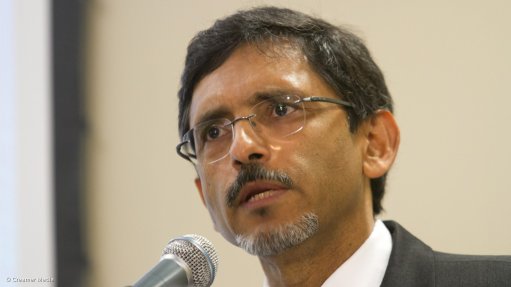
Economic Development Minister Ebrahim Patel
Photo by: Creamer Media
Economic Development Minister Ebrahim Patel reports that R11.6-billion has been mobilised as a result of cartel settlements and conditions placed on firms that have pursued mergers and acquisitions in South Africa since 2010, with commitments worth a further R11-bilion have been secured in relation to three impending deals.
The funds arose partly from fines levied on ArcelorMittal South Africa, as well as food and construction firms, which were found guilty of anticompetitive business practices. However, the balance had been secured in the form of conditions relating to transactions involving Old Mutual, Wal-Mart, Afgri, Pioneer, Coca-Cola, AB InBev and Chevron.
Addressing lawmakers during the Economic Development Department’s (EDD’s) budget vote on Thursday, Patel said that, besides the financial returns, the competition authorities and EDD had, over the last four years, also protected more than 65 000 jobs and secured commitments for the creation of a further 7 400 jobs.
“A further R11-billion was committed by three companies for new investment in their operations as a result of agreements with EDD reached during competition proceedings, one of which will see R6-billion invested to upgrade the Milnerton oil refinery here in Cape Town to make fuels environmentally safer.”
The refinery commitment related to the sale of the Chevron refinery, in the Western Cape, involving two rival bidders. While the deal had not been finalised, Patel reported that both bidders had agreed to expand black ownership of the company and ensure that the majority of Caltex service stations were owned and operated by local entrepreneurs.
“If the Chinese company, Sinopec, wins the bid, they will also sell South African goods in the shops across the Sinopec garages in China.” The other bidder is resources group Glencore.
Moves to extract financial, employment and social commitments during larger mergers are being intensified while South Africa considers ways to further strengthen its competition legislation to deal with high levels of concentration in certain markets.
In December, EDD released the draft Competition Amendment Bill for public comment, with the aim of increasing the power of the competition authorities to investigate and intervene to raise levels of competition in the economy with a view to improving prospects for inclusion of black business and entrepreneurs.
“This is a major reform of our 20-year-old Competition Act,” Patel said in Parliament, revealing that more than 60 submissions had been received on the proposed changes.
“We have also engaged Nedlac parties – business and labour – over the past few months. We will, during this year, finalise a revised Bill through Cabinet for submission to Parliament for consideration.”
Patel also reported that, in the year ahead, the competition authorities would investigate 100 cases of cartel conduct, consider a projected 400 mergers and take on an additional two cases of abuse by dominant firms in the economy.
“I expect to receive and table in Parliament this year, the outcome of three very significant market inquiries into private healthcare, grocery retail (which includes shopping malls and spaza shops) and communication data costs.”
He also confirmed that market inquiry hearings would be held on public passenger transport and the cost of communication data.